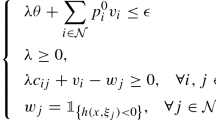Abstract
The paper establishes the necessary condition for the solution of a linear unconditional problem of combinatorial optimization on arrangements where coefficients of objective function are positive. These results are used to establish the properties of the solution of linear unconditional optimization problem on arrangements for the case where probabilistic uncertainty takes place in the definition of the feasible domain and the minimum is defined according to the linear order introduced on the set of discrete random variables: we formulate and prove the condition that can underlie the search for solution and the ways of constructing the solution in some special cases.
Similar content being viewed by others
References
Yu. G. Stoyan and O. O. Iemets, Theory and Methods of Euclidean Combinatorial Optimization [in Ukrainian], Inst. Syst. Doslidzh. Osvity, Kyiv (1993). http://dspace.puet.edu.ua/handle/123456789/487.
O. O. Iemets and T. M. Barbolina, Combinatorial Optimization on Arrangements [in Ukrainian], Naukova Dumka, Kyiv (2008). http://dspace.puet.edu.ua/handle/123456789/473.
G. P. Donets and L. M. Kolechkina, Extremum Problems on Combinatorial Configurations [in Ukrainian], RVV PUET, Poltava (2011). http://dspace.puet.edu.ua/handle/123456789/560.
O. A. Yemets, T. N. Barbolina, and O. A. Chernenko, “Solving optimization problems with linear-fractional objective functions and additional constraints on arrangements,” Cybern. Syst. Analysis, 42, No. 5, 680–685 (2006).
O. O. Iemets, Ye. M. Yemets, T. A. Parfionova, and T. V. Chilikina, “Solving linear conditional completely combinatorial optimization problems on permutations by the branch and bound method,” Cybern. Syst. Analysis, 49, No. 2, 264–278 (2013).
O. O. Iemets, Ye. M. Yemets, and Yu. F. Oleksiichuk, “Direct of cutoff method for combinatorial optimization problems with additional constraints,” Cybern. Syst. Analysis, 47, No. 6, 932–940 (2011).
T. N. Barbolina, “Solution of mixed combinatorial optimization problems on arrangements by the method of construction of lexicographic equivalence,” Cybern. Syst. Analysis, 49, No. 6, 922–931 (2013).
I. V. Sergienko and M. V. Mikhalevich, “Applying stochastic optimization methods to analyze transformational processes in economics,” Syst. Doslidzh. ta Inform. Tekhnologii, No. 4, 7–29 (2004).
Yu. M. Ermoliev and A. I. Yastremskii, Stochastic Models and Methods in Economic Planning [in Russian], Nauka, Gl. Red. Fiz.-Mat. Lit., Moscow (1979).
D. B. Yudin, Mathematical Methods of Control under Incomplete Information [in Russian], Sov. Radio, Moscow (1974).
Yu. S. Kan and A. I. Kibzun, Stochastic Programming Problems with Probabilistic Criteria [in Russian], Fizmatlit, Moscow (2009).
A. B. Naumov and S. V. Ivanov, “Analysis of the stochastic linear programming problem with quantile criterion,” Avtom. Telemekh., No. 2, 142–158 (2011).
K. Marti, Stochastic Optimization Methods, Springer-Verlag, Berlin–Heidelberg (2008).
I. V. Sergienko, Ol. O. Iemets, and Ol. O. Yemets, “Optimization problems with interval uncertainty: Branch and bound method,” Cybern. Syst. Analysis, 49, No. 5, 673–683 (2013).
O. O. Iemets and Ol-ra O. Yemets, Solving Combinatorial Optimization Problems on Fuzzy Sets [in Ukrainian], PUET, Poltava (2011). http://dspace.uccu.org.ua/handle/123456789/352.
O. O. Iemets and T. M. Barbolina, “Optimization problems with probabilistic uncertainty,” Dopovidi NAN Ukrainy, No. 11, 40–45 (2014).
O. O. Iemets and A. A. Roskladka, “Combinatorial optimization under uncertainty,” Cybern. Syst. Analysis, 44, No. 5, 655–663 (2008).
G. H. Hardy, J. E. Littlewood, and G. Polya, Inequalities, Cambridge University Press (1952).
O. O. Iemets and T. M. Barbolina, “Constructing and analyzing the mathematical model of the director mathematical problem with stochastic parameters,” Visnyk Cherkas. Univer., Ser. Prikl. Matem. Informatika, No. 18 (311), 3–11 (2014).
Author information
Authors and Affiliations
Corresponding author
Additional information
Translated from Kibernetika i Sistemnyi Analiz, No. 2, March–April, 2016, pp. 125–136.
Rights and permissions
About this article
Cite this article
Iemets, O.O., Barbolina, T.M. Properties of the Linear Unconditional Problem of Combinatorial Optimization on Arrangements Under Probabilistic Uncertainty. Cybern Syst Anal 52, 285–295 (2016). https://doi.org/10.1007/s10559-016-9825-2
Received:
Published:
Issue Date:
DOI: https://doi.org/10.1007/s10559-016-9825-2




